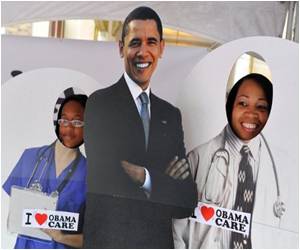US federal health spending will keep growing over the next 25 years but at a slower-than-expected pace, said the Congressional Budget Office in its annual long-term study.

The deficit is projected to shrink from 3.9 percent of gross domestic product in 2013 to 2.0 percent of GDP in 2015.
But that rate will rise to 6.4 percent by 2038, according to the independent agency, because of steadily rising health-care costs and an aging population.
And such rising long-term deficits could ultimately enlarge US debt held by the public to a level that is unsustainable for the economy, the report said.
It warned that the debt, currently about 73 percent of GDP, is expected to rise to 100 percent of GDP by 2038 unless reforms to public pension programs like Social Security are enacted.
"The bottom line remains the same as it was last year: the federal budget is on a course that cannot be sustained indefinitely," CBO director Douglas Elmendorf told reporters.
The International Monetary Fund estimated in April that total national debt will reach 108 percent of GDP in 2013.
"To be sure, the deficit has shrunk dramatically over the past few years from nearly 10 percent of GDP in 2009 to about four percent this year and we expect that under current law the deficit would decline further to about two percent of GDP," Elmendorf said.
"After that respite, however, we expect the deficit would start growing again."
Obamacare, as it has been nicknamed by its critics, is in its fourth year. Many Republicans are desperate to repeal the measure saying it will force health care costs higher.
A major plank of the law goes into effect October 1, when about 25 million uninsured Americans can begin registering for health care through a market exchange of public and private insurance plans.
By January 1, nearly all Americans will need to be insured or pay a fine.
Elmendorf said that despite "significant expansion" of federal support, "the great majority of growth in federal health care spending is not related to the Affordable Care Act."
But he cautioned about rising costs due to an aging population eligible for a raft of government programs, and lawmakers' reluctance to help pay for them.
"So we as a society have a fundamental choice of whether to cut back on those programs or to raise taxes to pay for them," Elmendorf said. "So far we've chosen to do very little of either."
Congressman Paul Ryan, the 2012 vice presidential candidate and author of an austere Republican plan to balance the budget in 10 years, said CBO revealed that Obamacare will not stop the explosion of costs and the rising debt.
"Obamacare will not solve the problem," Ryan said. "The law was a costly mistake. So we should replace it with real, bipartisan reforms."
House Speaker John Boehner said the report "serves as yet another warning that Washington must act now to rein in our massive deficits and debt, which are hurting our economy (and) costing jobs."
Source-AFP
 MEDINDIA
MEDINDIA




 Email
Email




